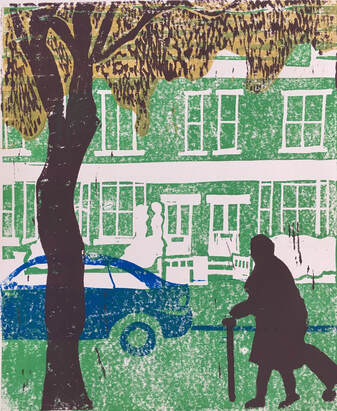 Lino print Lino print How do you see the world? Is it the 2 dimensional image that is monotone and with little detail? Do we like this because it keeps things superficial and does not draw us in too much? Is it the 3 dimensional layered image, which adds some perspective and allows us to add in the bits that are hidden, from our knowledge and experience? Is it perhaps an image to which we add a 4th dimension? - To whom are the houses home? Who is driving the car, where has it come from and where is it going? Who is that elderly person on their way to the shops and what is their situation? Who is my neighbour? The dimensions of this image might spark thoughts about the identity of the neighbour - who lives next door or down the street, lives far away and passes by in the car on their way to who knows where, potters by on the way to the shops etc. - giving shape to the web of interdependency that we live within and are sustained by. Even at this local level the web is wide, but spreads to all those on whom we depend, or who depend on us, around the globe. The big issues of the current time - migration, climate change etc. - emphasise how we all need to be aware of this web of interdependency and allow it to shape our decisions and way of life, rather than shrink away into a defensive nationalism that offers a false security. What is it that prompts such a wide awareness in us and has the ability to counter the fearful conservatism and narrow-mindedness of so many currently in places of influence? It is nothing other than the Spirit of God who conceived the whole creation and every race of people. The Spirit of Jesus, who through life, death and resurrection demonstrates a love for all in this world and beyond. There is a responsibility amongst those who have a sense of the unity of God’s creation to share this vision, this way of life, with others. It is not all about protest and political action, although these have an important place, but it is also about introducing others into a life where the Spirit of Christ is within, prompting and calling response. I recall an initiative in the ecumenical parish I served in the 1990s where folk were encouraged to pray for their neighbours - not just those who lived next door, but those who passed by and those they encountered regularly. People were invited to simply note down something that identified their neighbour (elderly man with cap, young mum with three kids, or a name if they knew it etc.) as a prompt for prayer, drawing others into that relationship with God that they enjoyed themselves. This takes witness to Jesus out of the institutional life of the church and into the everyday, into the life of the community, into the world where our dependency on God and our interdependency with people around the globe prompt action. In a world situation where so often we can feel helpless, faced by such enormous issues, it is a knowledge of who is our neighbour, along with a care for them, that gives us our role and purpose.
0 Comments
Leave a Reply. |
Archives
March 2024
|
 RSS Feed
RSS Feed
